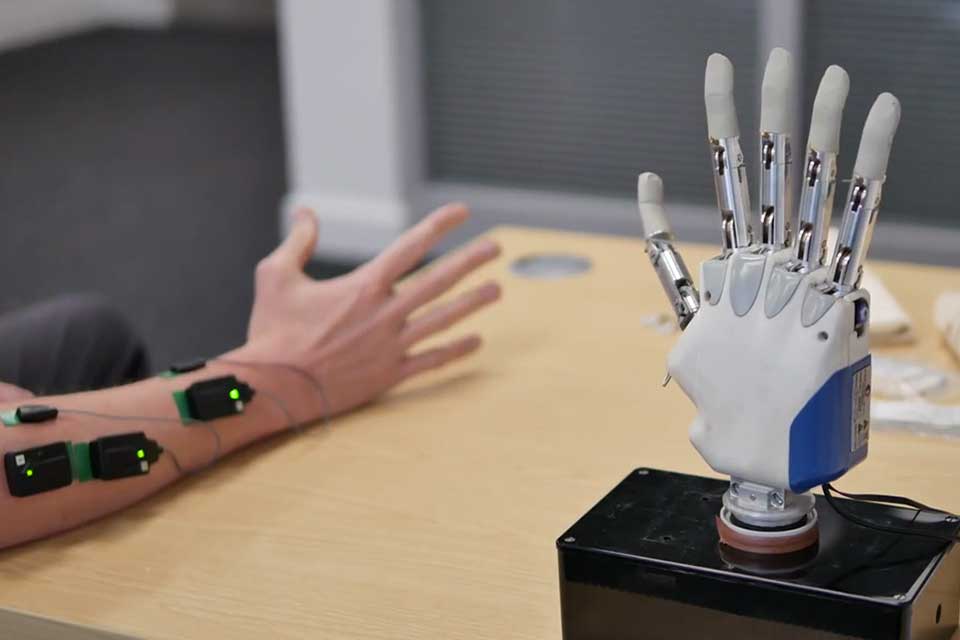Keele scientists showcase cutting-edge prosthetic hand research at national exhibition

Researchers from Keele University have been selected to present their work on the quest for a life-like prosthetic hand at the Royal Society Summer Science Exhibition.
Current prosthetic hands may look human, but their movements are robotic and limited. Biomedical Engineers Dr Dimitra Blana and Dr Ed Chadwick, from Keele’s Institute for Science and Technology in Medicine, in collaboration with colleagues at Newcastle University, are striving to transform prosthetics by recreating the natural brain-to-hand control signals, so prosthetic hands will move and feel like the real thing. Their research explores ways to convert a prosthetic user’s desired action into movement of their prosthetic hand, and to generate sensory feedback from the prosthesis to the brain.
The Royal Society Summer Science Exhibition is an annual display of the most cutting-edge science and technology research projects in the UK. At Keele’s ‘Progressive Prosthetics’ exhibit, visitors can learn how to control the movements of a mechanical hand, use virtual reality to see inside their arm as their hand moves, and play rock-paper-scissors using a robotic arm.
Dr Chadwick, Senior Lecturer in Biomedical Engineering at Keele University, said: “We use our hands for so many things, not only for performing tasks of everyday living but communicating and expressing emotion too. There are some really good prosthetic hands on the market right now which can almost replicate the movement of a natural hand, but controlling them is very difficult, so they are not used to their full potential. If we can provide the technology that can improve the control of prosthetic hands then we can help people regain some of their lost independence.
“Current prosthetic users have a lack of feeling and feedback that leads to unnatural control. They are missing the sense of touch, force on fingertips, and where their hand is in the space around them, so users have to focus really hard to control the devices with the result that it doesn’t feel very natural.”
Biomedical engineer Dr Blana explained: “We use computer modelling to improve the control of prosthetic hands; the computer model can predict the natural movement of the missing hand from the recorded muscle signals and these movement instructions can be passed on to the prosthetic hand. At the Exhibition, we will have a physical model of the hand that people can play with to see how hard it is to control, and visitors can interact with our computer model to see what your muscles do when your hands move. We will also have a robotic hand for visitors to operate with their own muscle signals.”
The Royal Society Summer Science Exhibition is a free science festival held on Monday, July 2nd to Sunday, July 8th, at The Royal Society in London.
Most read
- Keele University partners with Telford College and NHS to teach new Nursing Associate apprenticeship in Shropshire
- Emotion aware chatbot developed by Keele scientists offers transformative potential for mental health care
- First study of its kind sheds new light on Britain’s ‘forgotten’ World War Two decoy sites
- Keele cardiologist travels to Ethiopia to improve care for heart patients
- Keele academic wins prestigious prize for short story set in Stoke-on-Trent
Contact us
Andy Cain,
Media Relations Manager
+44 1782 733857
Abby Swift,
Senior Communications Officer
+44 1782 734925
Adam Blakeman,
Press Officer
+44 7775 033274
Ashleigh Williams,
Senior Internal Communications Officer
Strategic Communications and Brand news@keele.ac.uk.

